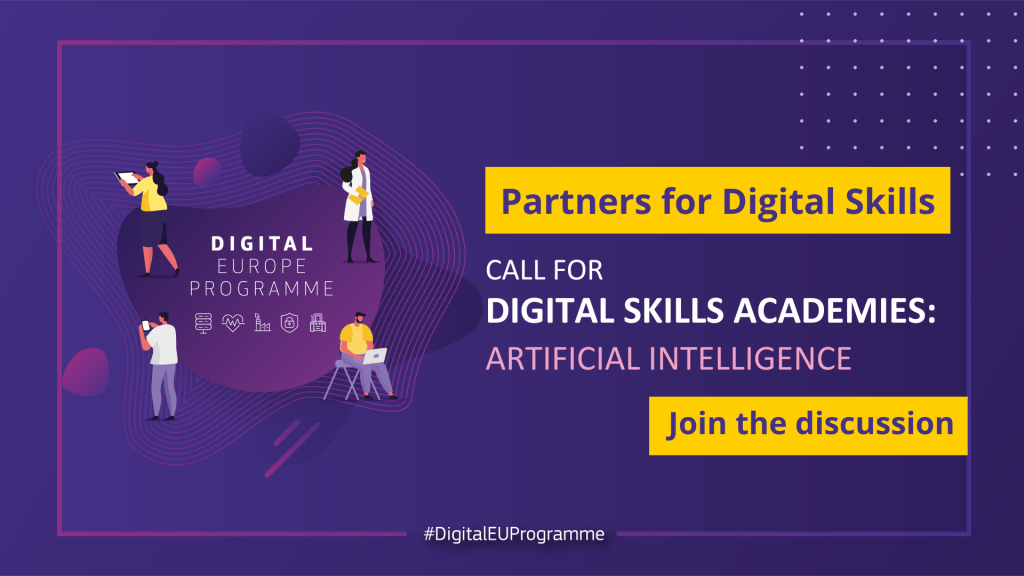Find a partner for the new call on sectoral digital skills academies: Digital Skills Academy in GenAI

Digital Skills Academy in GenAI: Join the discussion and find project partners!
Objective: The AI Skills Academy will be a one-stop-shop for developing educational and training schemes in two main focus areas:
- Skills for the uptake and deployment of AI and in particular ‘GenAI’ in key economic sectors;
- Skills related to the development and deployment of AI models in the ‘AI Factories’ facilities.
The academy will empower undergraduate, graduate, and post-graduate students, as well as current and future sector and ICT specialists in SMEs, startups, and the public sector with basic and advanced skills for developing, deploying and applying AI models and applications in their field.
Two projects will be selected to implement the AI skills academy. In the first call, the elements focused on the uptake and deployment of AI and GenAI will be covered. Another call will be organised at the end of the year to cover the specific skillset necessary for the development of AI models in the AI Factories’ infrastructures. The two projects will closely collaborate to ensure an aligned education and training offer.
Scope: In alignment with the other digital academies, the activities of the AI Skills Academy will be centred around three pillars of action.
Pillar 1: Knowledge, education, and training
Proposals should focus on designing, delivering, and scaling high-quality AI and GenAI education and training programmes aligned with EU labour market needs. It aims to assess existing AI skills gaps, develop new higher education curricula (Bachelor’s/Master’s level) and certified modules on GenAI model development and application across key sectors, as well as design vocational training schemes to boost employability for ICT and non-ICT learners. The Academy will also create and implement on-the-job training programmes tailored to specific professions and sectors, with materials made available for SMEs and public administrations. At least one certified Master’s programme, one vocational training scheme, and one on-the-job training per profile or sector (where feasible) will be delivered. A strong focus is placed on gender inclusion through scholarship and returnship schemes targeting women. Training content will cover GenAI development, inference, data science, and sectoral deployment. The Academy will collaborate with existing initiatives (e.g. ARISA, Erasmus+, EDIHs, DIGITAL-SO4) and align with the ELEVATE initiative to pilot and implement a certification seal of excellence for all training modules
Pillar 2: Building the ecosystem
Proposals should focus on building a strong ecosystem to attract, retain, and connect AI talent with opportunities across the EU. It aims to foster collaboration among businesses, academia, training institutions, research bodies, and public authorities by organising stakeholder events such as matchmaking and career days. Key actions include launching fellowship schemes to bring back PhD students and young professionals to Europe, piloting a full-time AI apprenticeship programme, and providing practical professional experiences in industry and public sector settings. The Academy will prioritise diversity, gender balance, and inclusion of underrepresented groups such as unemployed citizens and returning young professionals. To maximise reach and sustainability, the Academy will promote the uptake of its training programmes through leading universities and institutions in every Member State and engage national education ecosystems to scale up existing offers. A comprehensive communication strategy—featuring a dedicated website, a landing page on the Digital Skills and Jobs Platform, and targeted outreach campaigns—will raise awareness about education and career opportunities, especially among EU AI professionals abroad and high school students. Close coordination with the ELEVATE initiative and synergies with key EU projects (e.g. AI-on-Demand Platform, ARISA, EIT Campus, DTTI, and the Pact for Skills) will further amplify the Academy’s impact across Europe.
Pillar 3: Measuring Progress
This pillar focuses on measuring progress to ensure accountability, impact, and continuous improvement. It aims to develop and implement a robust methodology to monitor how effectively the Academy is addressing AI skills gaps, using EU frameworks like the Digital Decade Policy Programme and drawing on data from sources such as CEDEFOP, ARISA, and the Common European Data Space for Skills. Based on these insights and participant feedback, the Academy will adjust its activities accordingly. A sustainability plan will also be developed to ensure long-term impact beyond EU funding. Proposals must demonstrate alignment with all three pillars, show responsiveness to evolving labour market needs, and support EU strategic industries. Strong emphasis is placed on implementation quality, including detailed work packages, timelines, and partner roles—especially the involvement of industry. Projects must ensure wide dissemination and scalability, commit to ethical AI use, and promote inclusivity, particularly by increasing participation of women and underrepresented groups in the AI field.
Type of action and funding rate: Lump Sum Grants — 50% funding rate
Funding: € 7.000.000
Deadline: The application deadline is 2 October 2025 (17:00 Brussels time)
Call Text: The call for proposal text can be viewed here.
Call Information: Available on the Funding & Tender Portal.
Info session: On 16 May 2025, the European Commission presented theDIGITAL Europe Programme 8th Call for Sectoral digital skills academies in a dedicated Info Day. The full recording of the event is now available on the DigitalEU YouTube channel.
Find Project Partners & Prepare Proposals
Do you want to find consortia partners and participate in this call?
Simply use the Comments feature at the bottom of this tread to introduce your organisation, express your interest in creating or joining a consortia, indicate your desired role in the project, and provide a link to your Member Profile on the platform or your personal email address. You can see some organisations have already added their profiles below, so feel free to follow their lead! 
You can also message Community Members directly using the new Private Messages feature, just click the Messages button on the top right of the screen when you are logged in as shown in the screen grab below. This is an excellent way to contact potential partners in a secure and discrete manner. 
If you want to receive email notifications with the latest comments and posts by potential partners just click the Subscribe button beside the title of this thread: 
If you have questions or comments our Community Team are ready and waiting to help.
Best of luck with your proposals!



